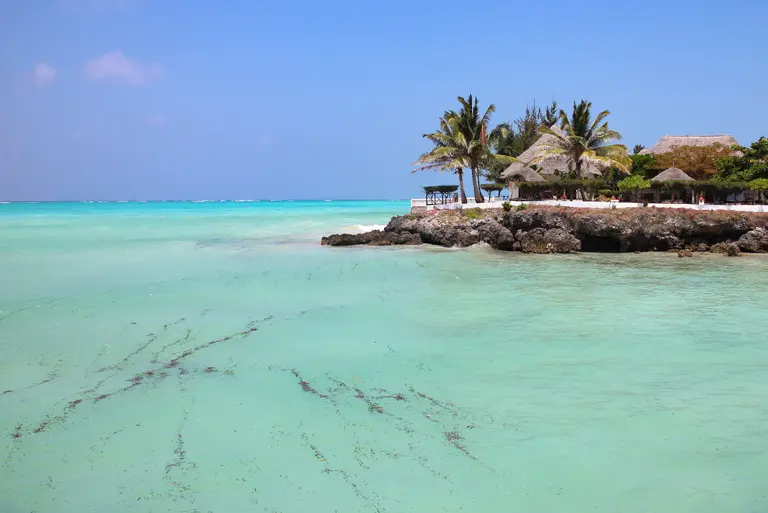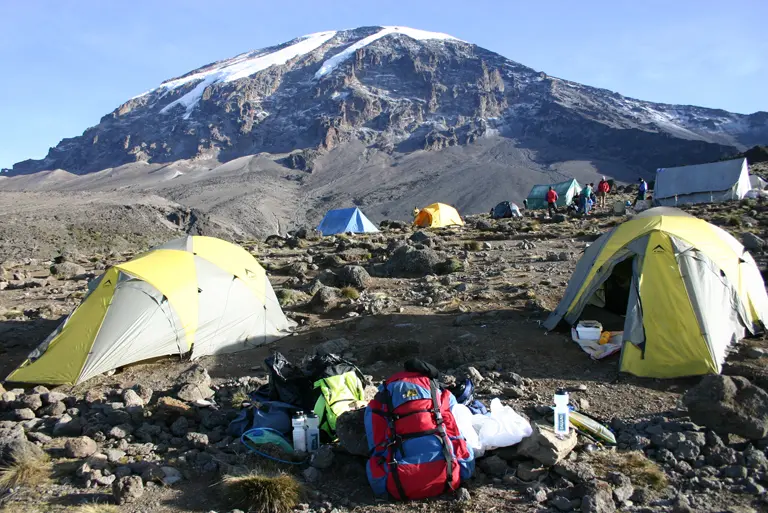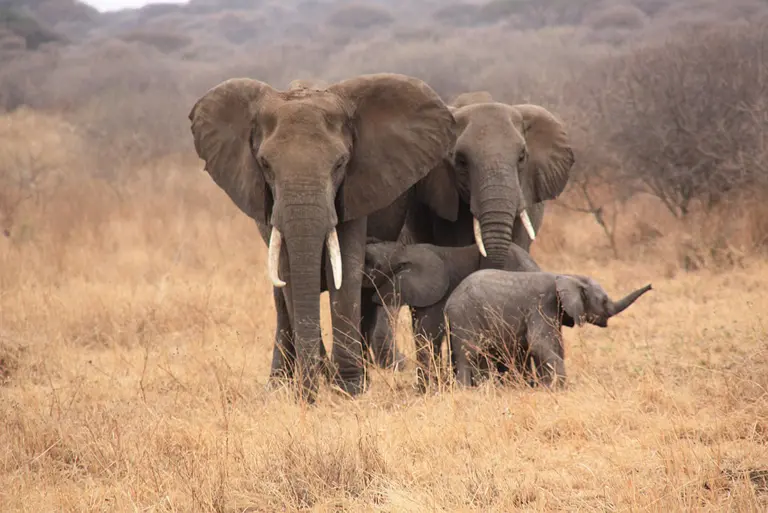





Reasons to Visit Tanzania
Wildlife
Great Wildebeest Migration
Beaches & Coral Reefs
Mount Kilimanjaro
Tanzania, formerly known as Tanganyika, is a fascinating country located in East Africa. With its seven UNESCO World Heritage Sites, Tanzania offers travellers a vibrant array of destinations that reveal ancient histories, unique wildlife, and rich cultures. It has earned a reputation as one of the world's melting pots for civilizations.
One of the most iconic features of Tanzania is Mount Kilimanjaro, the world's largest free-standing mountain, standing tall at 5,895 meters (19,341 feet).
Whether you're interested in superb game viewing of the Big 5 in various parks, witnessing the world-famous Serengeti Migration, exploring the ancient humanoid remains at Olduvai Gorge, or simply enjoying diverse cultural interactions and historic sites, Tanzania has something for everyone. Moreover, Tanzania offers the perfect blend of beach and safari experiences, allowing visitors to relax on palm-fringed beaches along the warm Indian Ocean, snorkel or swim off coral reefs, and indulge in the beauty of the natural surroundings. From basic camping scheduled safaris to luxurious lodges, Tanzania provides a wide range of accommodations to suit every traveller's preferences.
Situated in East Africa, Tanzania shares borders with Kenya to the northeast, Mozambique to the south, Zambia to the southwest, and small sections of Rwanda and Uganda to the north and northwest. The country is interspersed with stunning lakes, including Lake Victoria and Lake Tanganyika. Additionally, Tanzania is blessed with a picturesque coastline along the Indian Ocean, where the enchanting islands are located. Among these islands, Unguja (commonly referred to as Zanzibar) and Pemba stand out as the main attractions. Unguja, the business hub of Zanzibar, particularly the Stone Town, attracts numerous tourists.
Dodoma serves as the capital city of Tanzania, with a population of approximately 325,000, while Dar es Salaam, meaning "the house of peace" in Arabic, acts as the bustling economic and trade capital, hosting foreign missions, ministries, and the State House.
Tanzania boasts an impressive 20% of Africa's species of animals, making it a haven for wildlife enthusiasts. With an estimated 4 million animals scattered throughout its parks and reserves, Tanzania is home to a diverse range of creatures. The country harbours 430 species and subspecies, including a wide array of predators, 140 species of antelope, elephants, zebras, hippos, giraffes, buffaloes, primates, and many more.
Tanzania is also renowned for its remarkable birdlife. With approximately 1,050 bird species, including endemic and globally significant species, it is a birding paradise.
The country's varied ecosystems support a rich flora as well, with around 11,000 plant species. From tropical rainforests to acacia savannahs, Tanzania's plant life showcases incredible diversity. Notably, the montane forests in Tanzania contain about 7% of Africa's endemic plant species.
Tanzania's economy is diverse and encompasses various sectors such as agriculture, mining, manufacturing, tourism, and services. The country is rich in natural resources, including minerals like gold, diamonds, and tanzanite. Tourism plays a significant role in the economy, with visitors drawn to Tanzania's stunning landscapes, wildlife, and cultural heritage.
Tanzania is known for its rich cultural heritage, shaped by a mix of indigenous tribes, Arab influences, and European colonization.
The population of Tanzania is approximately 47.6 million. The country is home to over 120 ethnic groups, with the largest being the Sukuma, Chagga, Haya, and Nyamwezi.
Swahili is the official language, and English is widely spoken, especially in urban areas and among the educated population.
Tanzanian culture is diverse and vibrant, with traditional music, dance, and artwork playing integral roles. The people of Tanzania are known for their warm hospitality and friendliness, ensuring a welcoming atmosphere for visitors.
Tanzania offers an abundance of tourist attractions that cater to various interests. The country's seven UNESCO World Heritage Sites, including the Serengeti National Park, Ngorongoro Conservation Area, and Stone Town in Zanzibar, showcase Tanzania's rich natural and cultural heritage.
Witnessing the Great Migration of wildebeest and zebras in the Serengeti is a once-in-a-lifetime experience. Exploring the Ngorongoro Crater, a haven for diverse wildlife, and visiting the historical Stone Town with its fascinating architecture and narrow streets are must-see attractions. Other notable destinations include Mount Kilimanjaro, Tarangire National Park, Lake Manyara National Park, and the pristine beaches of Zanzibar.
The variety of experiences, from wildlife encounters to historical exploration and relaxation on idyllic shores, make Tanzania an unforgettable destination.
To enter Tanzania, travellers need a valid passport with at least six months of validity before returning to their home country. Most countries, including the USA, UK, EU, Australia, and New Zealand, require visas to enter Tanzania. Visas can be obtained in advance from Tanzanian High Commissions or on arrival, although it is recommended to arrange them in advance to avoid long queues.
The country's currency is the Tanzanian shilling, and credit cards (Visa and MasterCard) are sometimes accepted in shops, restaurants, and some lodges, but it is advisable to carry extra cash.
Travel insurance is essential and should include comprehensive medical cover, emergency repatriation, and coverage for loss, damage, or theft of personal belongings.
For a safari in Tanzania, it is recommended to pack neutral-coloured casual clothing suitable for everyday wear, avoiding bright colours or white that may not be suitable for game viewing. Sturdy shoes or trainers with good traction soles are necessary for walking. Depending on the season, packing a light jacket or jumper for summer or a warm jumper and jacket for winter is advised. Other essential items include a sunhat, sunglasses, insect repellent, sunscreen, a refillable water bottle, a small first aid kit, and binoculars. It is also important to carry necessary travel documents, including passports, visas, insurance details, and any prescribed medications.
The electricity voltage in Tanzania is 230 volts, and the frequency is 50 Hz. Tanzania uses the Type D and Type G electrical outlets. Type D outlets have three round pins in a triangular pattern (most commonly used), while Type G outlets have three rectangular pins. If your electrical appliances use a different type of plug, you will need a plug adapter. It's essential to check the voltage requirements of your appliances before using them in Tanzania. Some appliances may require a voltage converter or transformer for compatibility.
It is a requirement to have comprehensive travel insurance when traveling with Chameleon Holidays and Travel. The insurance should cover full medical expenses, emergency repatriation, cancellation, and loss, damage, or theft of personal belongings. It is recommended to carry insurance details at all times and provide them to the travel agency before arrival. In case of accidents or health emergencies during the trip, having proper insurance coverage is crucial. Chameleon recommends using World Nomads for travel insurance.
